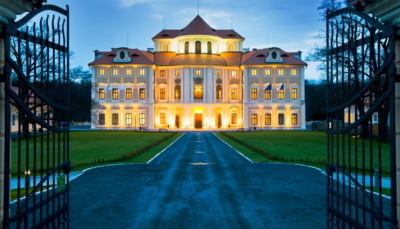
VentureCamp provides chance to create start-up plans
INDIANAPOLIS — A first-of-its-kind boot camp for aspiring tech entrepreneurs, being held at one of Indianapolis’ oddest mansions, finds the campers milling by the swimming pool among life-sized, concrete statues.
The talk is of digital start-ups and the name-dropping is thick. In their first week of camp, participants heard from Jeff Hoffman, founder of online travel booking website Priceline.com. This day’s poolside gathering includes the likes of Ekaterina Walter, author of the best-selling book “Think Like Zuck,” about Facebook founder Mark Zuckerberg.
The mansion setting on the Northeastside of the city is meant to give the class of entrepreneurial students a taste of the life that could be theirs if they just had a bit more start-up savvy.
Which is what they are in the midst of learning at “VentureCamp 1.0,” as mansion owner and camp co-organizer Chad Folkening calls his latest business proposition.
Folkening, who’s in his early 40s, makes the rounds poolside, sunglasses perched atop his head, chatting with the 12 entrepreneurs picked for the all-expenses-paid camp.
“It might fail, it might succeed,” said Folkening, shrugging when asked how the camp is going. A Westfield, Ind., native and Internet domain name and real estate investor who now lives mostly in Florida, Folkening has spent more than $100,000 to put on this unusual blend of summer camp and business seminar with a distinctly nerdy feel. A diverse group of campers was picked from around the country from more than 500 who filled out online applications.
California’s Silicon Valley might not blink at such things, but it’s fair to say Indianapolis has never seen anything quite like this eight-week tech gathering that kicked off last week in the Kessler Mansion. Folkening bought the 26,000-square-foot, ornately decorated house off Kessler Boulevard on something of a lark seven years ago.
After finding the house didn’t suit his family’s lifestyle, he decided that a “fully immersive new start-up ecosystem,” as the camp describes itself, was as good a temporary fit as any for the mansion. Folkening, whose first business was mowing lawns as a teenager, sees the camp as a way to encourage entrepreneurship, find a new way to sell his 20,000 Internet domain names through his company Global Ventures, and also get some use out of his mansion.
Over the coming weeks, the campers will hear from a dozen speakers, sit through hands-on sessions with trainers, then launch into the program’s denouement: They will split into teams to create business plans for actual tech companies from scratch. That includes making a pitch for funding to venture capital investors.
“It’s MBA school on steroids, with a sustainability component. We’re going to work ’em hard and train ’em,” said Stefan Doering. His New York business education firm, Shift Group, was hired to run the program.
The whole event has the overlay of a TV reality show because Folkening decided to film the participants, from the time they awaken until they turn in at night.
A VentureCamp senior adviser and spokesman from Washington, D.C., Patrick Mellody, said the idea of filming is to create a “docu-series” that will be used as a tech community’s version of the popular, close-to-the-action NFL Hard Knocks cable TV production (minus the grunts and with open-collared techies subbing for helmeted linemen). The film will promote future VentureCamps that could be held at other sites around the world, Mellody said, and perhaps be sold to a broadcaster for viewing by business audiences.
“Sometimes I’m a little taken aback,” camper Kevin C. Ott said of the camera crews that are filming at the mansion.
Fortunately, Ott said, “They don’t come in when we are having private times or in the bathrooms.”
Participants came to camp armed with business start-up ideas. Several of them said they hope the camp will help turn the ideas into functioning dot-com businesses, perhaps using one of the many domain names Folkening owns and is eager to sell.
Ott, 32, a former Marine who works in Orlando, Fla., for a defense contractor, said he wants to create a computer app that consumers can use to interact with clothing retailers and check out their merchandise.
It was vacant. I live in Florida. That’s part of the reason we are having VentureCamp here.
Chad Folkening, co-organizer of VentureCamp
Quynh Pham, an immigrant from Vietnam, was about to rent an apartment in San Francisco when she heard about VentureCamp, signed up, and abruptly left for Indianapolis. “The real estate agent was kind of mad at me,” she said.
Pham’s hopeful the camp will help her start a website to help travelers find local tour guides for whatever city they’re visiting.
Michael Coffey, director of business development at KA+A brand design firm in Indianapolis, said the camp is evidence of the city’s thriving tech community.
“I love the idea of what’s going on here,” he said. “If it gets us more visibility, great.”
Walter, who is fresh off writing the Zuckerberg book, said she volunteered to speak at the camp to share a message that entrepreneurs “don’t just talk; they act.”
“I am just hoping maybe I will inspire them,” she said of the camp participants.
The head-turning mansion, meant to be an inspiration for the VentureCamp participants, turns out to be a financial challenge for its owner.
Folkening tried unsuccessfully to sell it last year at a list price of $2.2 million. He admits that finding a use for the sprawling mansion had much to do with starting the camp.
“It was vacant,” he said. “I live in Florida. That’s part of the reason we are having VentureCamp here.”
The mansion was built piecemeal over the years from four ranch homes by a one-time pimp-turned-contractor, Jerry Hostetler, who died in 2006.
It’s clear the place has turned into a demanding mistress with expensive tastes. Just installing railings on the mansion’s quarter-mile of open decks cost $250,000. A shovel resting near a pile of dirt shows where underground pipes are leaking. The lighting is confounding, with single switches turning on dozens of bulbs. Large parts of the place seem unused.
“There’s been seven years of renovation,” Folkening said of the house. “Nothing is small here.”

